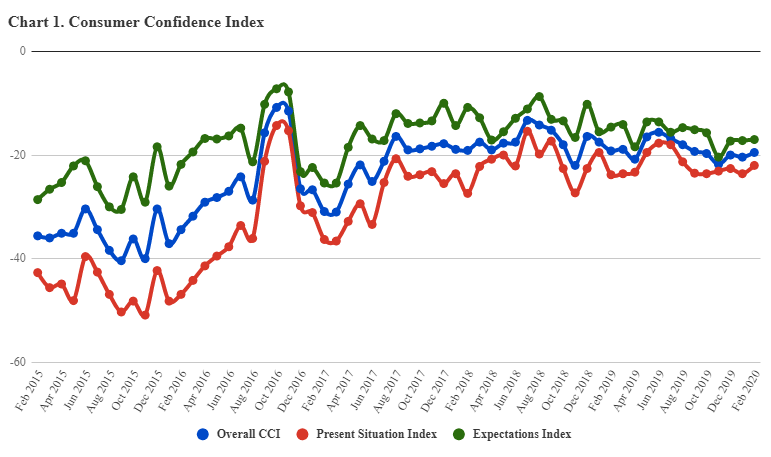- Details
- In April 2020 Consumer Confidence reached the lowest level ever recorded, driven by severe deterioration in expectations about the future.
- Notably, the present situation index component of CCI stands slightly higher than during the regional currency crisis and lari devaluation episode in May-November 2015.
- The supplementary CCI poll reveals that nearly 24% of interviewed population have completely lost their jobs.
- Nearly 35% expects to partially get their jobs back after the quarantine ends.
- 10% of respondents do not expect to get their jobs back. In the same time, 13% do not know what will happen to their jobs.
- Around 30% of interviewed people reported their families did not have enough resources to live on until the 21st April.
- Around 60% both in Tbilisi and in the rest of Georgia reported their families would not have enough resources to live on if strict quarantine is extended until the end of May.
- In the same time, the interviews reveal that an overwhelming majority of people (81%) tends to trust the health advice and information on COVID-19 coming from the authorities.
A nationally representative sample of around 350 Georgians (Table 1 below summarizes the demographic background of the sample), interviewed in early April, reveals that Georgian Consumer Confidence reached a historic low point in April. The CCI has sunk this month by a significant 15.2 index points, from -33.1 in March to -48.3 in April.
The record drop was driven by the lowest-ever expectations index, indicating that people have grim forecasts about the future of the economy despite the fact that they tend to trust the health and pandemic related information coming from the authorities.
- Details
A nationally representative sample of around 350 Georgians, interviewed in early March 2020, reveals that the Consumer Confidence Index (CCI) has declined by a significant 13.6 index points (from -19.5 in February 2020 to -33.1 in March 2020), compared to February 2020. This is the weakest and lowest figure since March 2017. The steep decline in March reflected rising worries about the coronavirus during the survey period and concerns about the damage the virus would cause. Additionally, it is quite possible that social media posts about the virus could also spread panic and negatively impact consumer behavior caused by the changes in how they worked, shopped, ate, traveled etc.
Returning to the consumer confidence figures, it is noteworthy that both sub-indices, the Present Situation Index and the Expectations Index, contributed to the decline. More specifically, the Expectations Index played a larger role in the decline. It is also important to highlight that both sub-indices in March 2020 hit their lowest levels in the recent two years. In terms of numbers, the Present Situation Index declined by 11.3 index points (from -22 in February 2020 to -33.3 in March 2020), and Expectations Index dropped by an even more significant 16 index points (from -17 in February 2020 to -33 in March 2020).
- Details
A nationally representative sample of around 350 Georgians, interviewed in early February 2020, shows that the Consumer Confidence Index improved by 0.9 index points, from -20.4 in January to -19.5 in February, which could be because consumers usually pull back in January after spending fairly more during the Christmas celebrating season. Nevertheless, it is worth noting that it is not a usual practice to observe a positive variation in February in the consumer confidence figures in the previous years. The two sub-indices, capturing consumer expectations and present situation assessment, also demonstrated improvement. Present Situation Index increased by 1.6 index points, from -23.6 in January to -22 in February. Its complement, Expectations Index, added slightly, by 0.2 index point, rising from -17.2 in January to -17 in February. So, Georgians seem to be a bit more optimistic in February due to the Present Situation Index increase. It should also be noted that consumer confidence interviews were conducted in early February before coronavirus spread beyond China to other countries such as South Korea, Iran and Italy, notably before it reached to South Caucasus and darkened the outlook. Therefore, consumer confidence figures for February miss much of any concern about the coronavirus.













